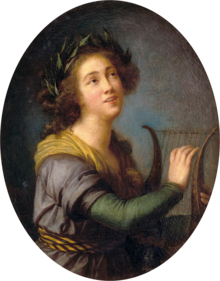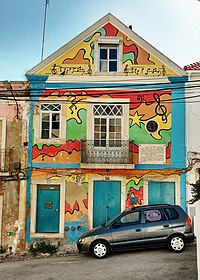Luísa Todi
Luísa Rosa de Aguiar Todi (born January 9, 1753 in Setúbal , † October 1, 1833 in Lisbon ), also known as La Todi , was a Portuguese opera singer .

Life
Born into a family of musicians and theater actors, Luísa Todi also appeared on stage for the first time in 1767 at the age of 14, in Tartufo ( Tartuffe ) by Moliere (in the Teatro do Conde de Soure ). Her family had moved to Lisbon in 1765. In 1769 she married her admirer, the Italian violinist Francesco Saverio Todi, on whose initiative she received vocal training from Davide Perez (1711–1778), the author of the opera Solimano . She subsequently worked with him frequently, and later a. a. at the Teatro Nacional de São Carlos . In 1770 she sang an opera for the first time at the Theater des Bairro Alto in Il viaggiatore ridicolo by Giuseppe Scolari , who had already settled in Lisbon in 1768. Todi lived in Porto from 1772 to 1777 , where she worked both as a singer and as a private tutor. In 1777 she sang for the first time abroad, in the King's Theater in London .
This was followed by guest appearances in Paris and Versailles (1778), Austria , Italy (especially her engagement in 1780 as prima donna at the Teatro Regio di Torino in Turin ), Prussia and other German states. Todi now achieved considerable international fame. The German singer Elisabeth Mara , who was also celebrated all over Europe at the time , had a growing number of admirers, and music-interested Europe split into deathists and maratists , especially after the two singers competed in Paris in 1782. As a result, Todi's popularity rose further .
In Saint Petersburg in 1784 she sang in Sarti's opera Armida e Rinaldo with the Italian castrato singer Luigi Marchesi . The Russian Empress Catherine II settled an emerging dispute, triggered by Todi's popularity and the jealous Sarti and Marchese. A longer engagement at the Russian court followed. In 1788 she sang at the court of Friedrich II (Prussia) , and then returned to Paris with her concert series of Concerts Spirituels .
After repeated guest appearances in Germany, including with the young Beethoven in Bonn , she sang in various Italian cities, where she enjoyed great success, especially in Venice in 1790 . After problems with her eyesight first emerged, Todi interrupted her career after 1790. After recovery and resumed activity as a singer, she toured Italy again before living in Madrid from 1792 to 1796 , where she performed particularly at the Teatro de los Caños del Peral (dem later Teatro Real ) experienced successes.
She gave her last international guest appearance in Naples in 1799 . In 1801 she returned to Portugal, where she lived in Porto. Her husband died in 1803. During the Napoleonic invasion in 1809, she and many other residents of the city fled across the Douro River , losing a large part of her property in the form of jewelry in the river. She was arrested by the French occupation, but released General Soult and placed her under his protection after her identity became known to him.
She then moved to Lisbon, where she lived from 1811 until her death in 1833, in increasingly simple circumstances and with further dwindling eyesight, the last few years finally in complete blindness. The street where she lived in Lisbon until her death is now called Rua Luísa Todi .
She was buried in Lisbon in the cemetery of the Parish Church of Encarnação , which is now located under the building at number 78 on Rua do Alecrim in the Chiado district.
reception
In Portugal itself she was not as recognized and famous as she was abroad. She sang for the Portuguese royal family in 1771 and again in 1783, at the height of her international popularity, but was largely ignored here while she was celebrated at the most important courts in Europe. Anton Reicha described her as the singer of all centuries in his book Traité de melodie while she was still alive . Today her importance in her home country is undisputed, and an important young talent award in classical singing is named after her, the Concurso Nacional de Canto Luísa Todi . In their hometown Setúbal their name u. a. Schools, a street in the city center, and the Forum Municipal Luísa Todi , where u. a. the international film festival Festróia takes place every year. There is also a monument to her in the downtown street, Avenida Luísa Todi , named after her . The city of Setúbal recently acquired the house where the Todi were born in order to set up a museum dedicated to them.
In 2008 the director Rui Esteves made a film about her life, after research and with the musical assistance of the conductor João Paulo Santos , and with texts by Maria João Seixas . A co-sponsor of Todi - A Segunda Morte de Luísa Aguiar was the Lisbon Opera, the Teatro Nacional de São Carlos , one of the cities of the Todi. Laura Soveral plays the forgotten Todi, who searches for a day in today's Setúbal, Lisbon and Porto for traces of her work and the stations of her life, telling her life story until she dies a second time at the end of the day. Various Portuguese opera singers will sing traditional Todi success arias. The film was broadcast on RTP's second channel as part of a series about important figures in Portuguese culture ( Série Figuras Relevantes da Cultura Portuguesa ) in 2008 and released on DVD / CD box by Midas Films in 2009 .
Web links
literature
- Mário Moreau: Luísa Todi: 1753-1833. Hugin, Lisbon 2002, ISBN 972-794-160-5 .
- Joaquim de Vasconcelos: Luísa Todi: Estudo Crítico. Sementes de Mudança, Évora 2008, ISBN 978-989-95648-7-9 .
Individual evidence
- ^ Entry in the Internet encyclopedia of the Porto Editora , accessed on July 1, 2012
- ↑ Luísa Todi in the Find a Grave database . Retrieved January 8, 2015.
- ^ Website of the Instituto Camões , accessed on July 1, 2012
- ↑ www.midas-filmes.pt , the film on the website of the distributor Midas Films , accessed on July 1, 2012
- ↑ www.imdb.de , the film in the Internet Movie Database , accessed on July 1, 2012
| personal data | |
|---|---|
| SURNAME | Todi, Luísa |
| ALTERNATIVE NAMES | Todi, Luísa Rosa de Aguiar (full name); La Todi |
| BRIEF DESCRIPTION | Portuguese opera singer |
| DATE OF BIRTH | January 9, 1753 |
| PLACE OF BIRTH | Setúbal , Portugal |
| DATE OF DEATH | October 1, 1833 |
| Place of death | Lisbon , Portugal |

